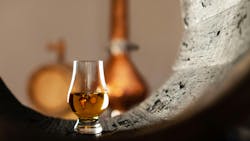Cheers! Whiskey Waste Becomes Biochemicals
Scientists from Ripcell, a chemical manufacturing start-up in Aberdeen, UK, are working with researchers from the University of Aberdeen to demonstrate the feasibility of recovering high-value compounds, such as lactic acid, from pot ale and spent lees — byproducts of the first and second stages of the whiskey distillation process.
These extracted chemicals have potential applications in pharmaceuticals, food and drink and cosmetics, where manufacturing typically depends on unsustainable, petrochemical-derived ingredients.
The project was funded by the Industrial Biotechnology Innovation Centre (IBioIC). Whiskey group Chivas Brothers provided samples of waste streams from 25 of its distilleries across Scotland.
The research team developed a process using a separation technique known as liquid chromatography to isolate and extract higher-value acids, initially from pot ale. It has now been adapted to retrieve additional solvents from spent lees.
While residue from pot ale is typically used in low-value applications such as animal feeds, spent lees are currently discarded. Up to 10 L of spent lees are generated for every liter of whiskey made, and due to variations in distillery processes, water sources and raw materials, byproducts from different distilleries contain different chemical compounds.
A life cycle analysis of the process was also completed to quantify its environmental impact. The results showed that the bio-based chemicals produced through this method have a significantly lower carbon footprint compared to those produced through traditional petrochemical routes. Estimates suggest that on a global scale, the new manufacturing method for target chemicals could reduce industry emissions by 392 million kg of CO2 equivalent per year.
The team's next phase will involve scaling up the separation process to prove its viability at an industrial scale.
“Around 2.6 billion L of wastewater is produced from the Scottish whiskey industry every year, so the potential of this process is huge. For decades, the majority of these co-products have been used as animal feed, but we have found a new, more valuable option to deal with spent lees that could change the ways in which distilleries manage and process their residues,” said Eve Wildman, founder of Ripcell.
“At the same time, this could be transformational for the chemicals industry,” she added. “By taking a sustainable approach to manufacturing key compounds, rather than using fossil fuels, Ripcell can help to reduce greenhouse gas emissions from the production process. For every kilo of biochemicals produced, we can remove 1.59kg of harmful greenhouse gas emissions.”
